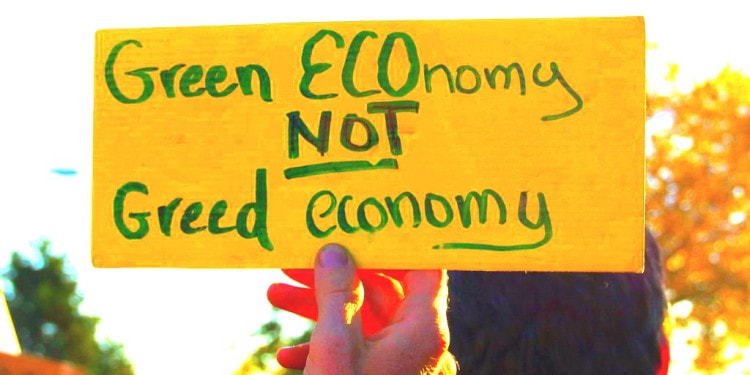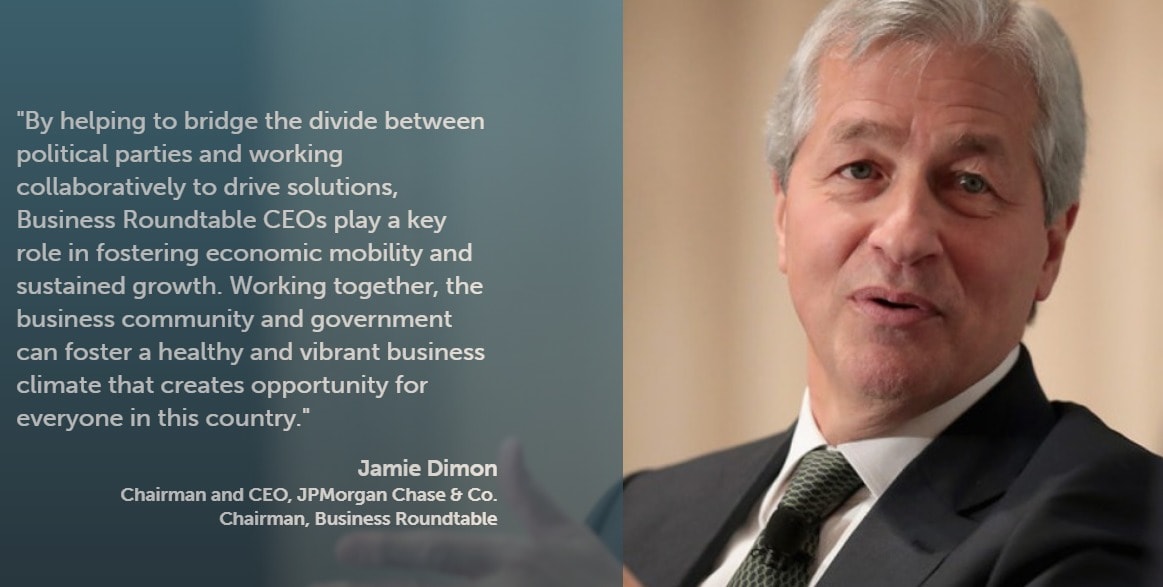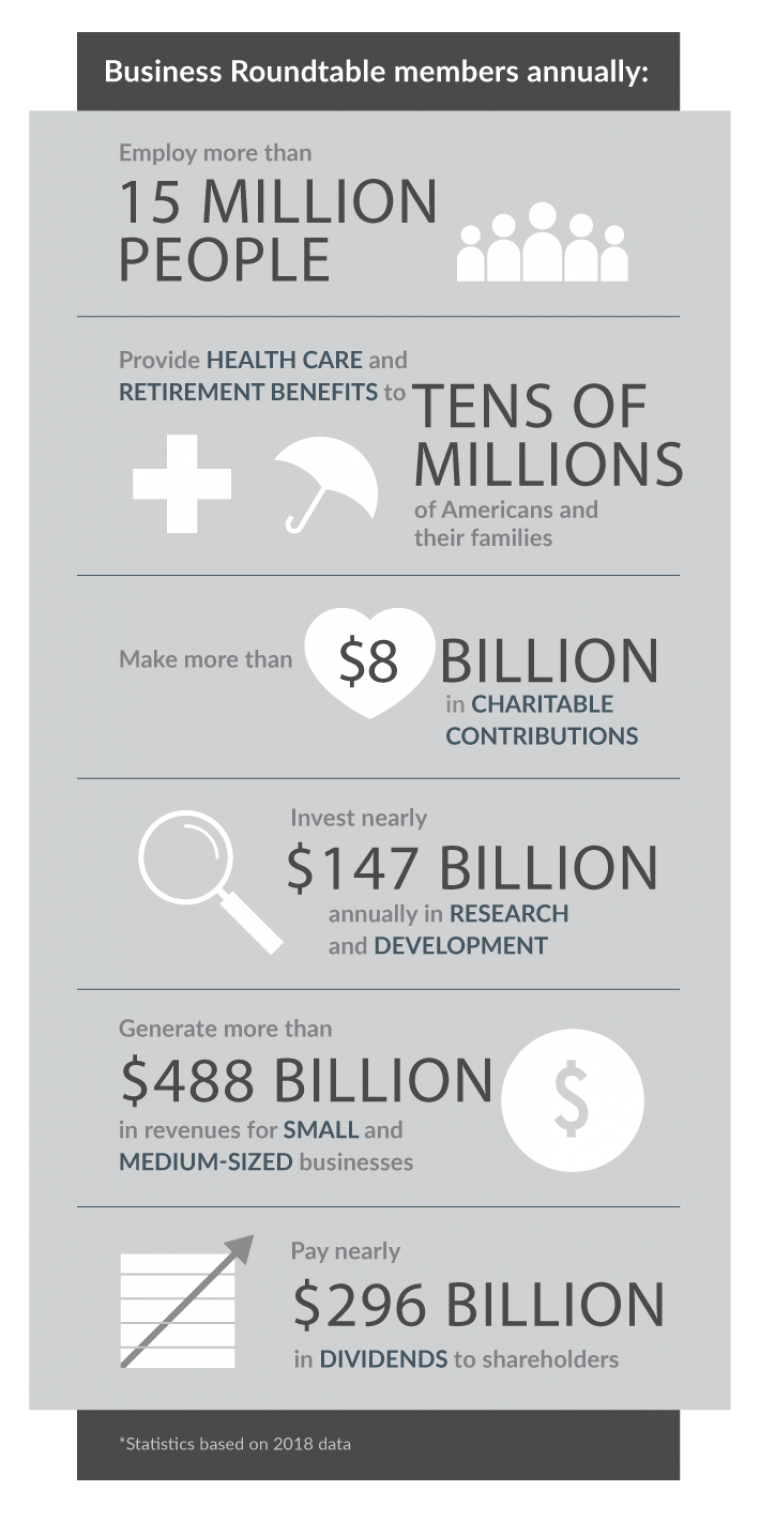On August 19, nearly 200 major American CEOs have subscribed to a new statement of purpose released by the Business Roundtable (BRT). It calls for a radical change to the principle of maximizing shareholder value. To be replaced with the concept of maximizing “stakeholders’ value”. Or, put another way, business goals should include “commitments to all stakeholders” – not just shareholders.
Does this mean the ground is finally shifting under American business? It looks like climate change, sustainable principles of production including the circular economy, respect for the environment and equal rights have all crashed into the CEO office floor, shaking the neo-liberal ideology. Are we to believe that the single-minded pursuit of profit and maximizing shareholder value is no longer a cornerstone of American business? Or is this another example of refined “greenwashing”?
Business Roundtable announces the release of a new Statement on the Purpose of a Corporation signed by 181 CEOs who commit to leading their companies for the benefit of all stakeholders – customers, employees, suppliers, communities and shareholders. https://t.co/ZWMRTDZRqA. pic.twitter.com/8Kd4IVFjva
— Business Roundtable (@BizRoundtable) August 19, 2019
One particular passage in this statement is worthy of note: Business is called upon to “respect the people in our communities and protect the environment by embracing sustainable practices across our businesses.”
Embracing “sustainable practices”!
Something like this has never happened before in America, particularly in Trump’s America. And indeed, the event should also be read in terms of national politics. The presidential elections are fast approaching, Trump is in full campaign mode.
That is why the BRT statement is in fact a strong call to government to wake up on all the issues Trump has ignored or downplayed so far: climate change, sustainability, education and skills upgrading, infrastructure, international trade, including USMCA, the new treaty with Mexico and Canada still awaiting signature.
The list of issues that need to be addressed is endless and, in the view of these business leaders, resolution is essential both for good business and for the happiness of American people. “The American dream is alive, but fraying,” said Jamie Dimon, chairman and CEO of J.P. Morgan Chase and BRT chairman. “Major employers are investing in their workers and communities because they know it is the only way to be successful over the long term. These modernized principles reflect the business community’s unwavering commitment to continue to push for an economy that serves all Americans.”
Along with Dimon, the statement received signatures from top business leaders including Amazon’s Jeff Bezos, Apple’s Tim Cook, Oracle’s Safra Catz, Bank of America’s Brian Moynihan, Boeing’s Dennis A. Muilenburg, GM’s Mary Barra, Bayer’s Philip Blake, Coca Cola’s James Quincey and BlackRock chief Larry Fink.
Beyond this impressive list of signatories (the full list can be seen here), this latest statement of purpose put out by BRT is unquestionably a watershed event. Worth celebrating.
Why the New BRT Statement of Purpose Marks a Watershed in American Corporate History
Because, first of all, BRT, founded in 1972, has always supported free market guiding principles over everything else. In reaction to the 1960’s civil rights movement and what was perceived as “socialist” attacks on American business, co-founder John Harper of ALCOA clarified BRT’s goal in 1975 : “business must take an active, aggressive role in developing understanding of and support for the free-market system by reestablishing the public’s confidence in business” he said. “Without question, we have our work cut out for us.”
Historically, BRT was instrumental in helping to defeat a major 1977 AFL-CIO Labour Bill that would have strengthened labor unions. That defeat marked a turning point in business relations with employees and workers. Trade unions never recovered. In 1985, BRT helped to expand Reagan’s tax cut in favor of corporations and lobbied successfully to open foreign trade markets to American business. Over the years, BRT has grown steadily, attracting hundreds of CEOs of large, medium and small businesses. Still, of all the conservative think tanks, it is the most liberal, and by 2010, it was considered President Obama’s “closest ally in the business community”.
Today it is a conservative think tank that matters in the American economy:
Second, BRT has put out many statements on the principles of corporate governance. As late as the 1990s, it still maintained that maximizing shareholder values was its core principle and its “statement of purpose” always reflected that principle.
As BRT says in its press release: “Each version of the document issued since 1997 has endorsed principles of shareholder primacy – that corporations exist principally to serve shareholders.” But now, the updated statement “moves away from shareholder primacy” and for the first time includes “commitment to all stakeholders”.
Here is the core message:
…While each of our individual companies serves its own corporate purpose, we share a fundamental commitment to all of our stakeholders. We commit to:
– Delivering value to our customers. We will further the tradition of American companies leading the way in meeting or exceeding customer expectations.
– Investing in our employees. This starts with compensating them fairly and providing important benefits. It also includes supporting them through training and education that help develop new skills for a rapidly changing world. We foster diversity and inclusion, dignity and respect.
– Dealing fairly and ethically with our suppliers. We are dedicated to serving as good partners to the other companies, large and small, that help us meet our missions.
– Supporting the communities in which we work. We respect the people in our communities and protect the environment by embracing sustainable practices across our businesses.
– Generating long-term value for shareholders, who provide the capital that allows companies to invest, grow and innovate. We are committed to transparency and effective engagement with shareholders. Each of our stakeholders is essential. We commit to deliver value to all of them, for the future success of our companies, our communities and our country.
So is this “greenwashing”? The question is worth asking particularly today as the UK Guardian breaks the news that Amazon (one of the signatories) is criticised by environmental groups and customers for introducing plastic packaging that cannot be recycled in the UK.
Yet the answer is that the BRT statement is not a clever form of greenwashing. There is one key aspect that doesn’t change: “generating long-term value for shareholders”. It is acknowledged as a central business goal and remains unabashedly so. What is new is that each one of a business’ stakeholders is viewed as “essential”. For the first time, business leaders commit to “deliver value to all of them”.
Trump, a man singularly focused on his fan base and wedded to a divisive approach to politics, will surely ignore this. But the Democrats’ candidates to the Presidency should not. There are plenty of votes in the business community to be picked up.
Featured Image: Flickr, author: Lily Rhoads
















